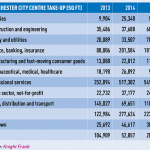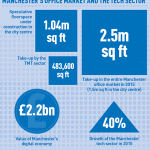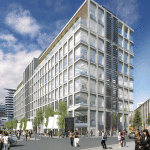Manchester’s £2.2bn tech sector is now the city’s second-largest office occupier – and it could soon be the largest.
Analysis by Edwards & Co of office deals in the city centre, south Manchester business parks, Old Trafford and Salford Quays shows that in 2015 the TMT sector accounted for lettings totalling 483,600 sq ft. TMT was ahead of professional services, which accounted for deals totalling 463,900 sq ft, and just behind financial services, at 513,000 sq ft.
Tech is not dominant in Manchester in the way that it is in London (19% in Manchester; 27% in the West End, 28% in the City, according to JLL). But watch out – it is growing.
Andrew Timms, director at Edwards & Co, says the tech sector is rolling over the city like a tsunami.
“The tech sector in Manchester has grown rapidly in the past 12 months, and the big changes have been in Salford, which has seen a surge in take-up. But we are also seeing fast growth in the city centre, particularly in the Northern Quarter.”
Several initiatives are being prepared to meet tech occupiers’ needs. A 70,000 sq ft redevelopment of Federation House, part of the NOMA development near Victoria Station, is intended to provide a new base for start-ups. And in Salford, landlord Peel is behind the development of the 50,000 sq ft Tomorrow building at MediaCity.
Meanwhile, Allied London is unveiling plans for a mighty new tech development to build on its existing (and all but fully let) 160,000 sq ft XYZ building. Chief executive Mike Ingall calls it “XYZ times 10” to give a sense of the scale of the company’s ambition.
Whatever its full formal name – to be revealed this week at MIPIM in Cannes – it will trade on this insight. The 400,000-500,000 sq ft development will include the 100,000 sq ft Bonded Warehouse, formerly used by a local TV company. “This will be a collegiate workspace with lots of different uses there to attract enterprise, and I don’t want to use the word ‘tech’…” says Ingall.
But rather than focus on trendy co-working space – dismissed by Ingall as unprofitable but jolly – many Manchester developers are focusing on attracting the big corporate and professional occupiers whose business depends on TMT. And they will come to Manchester for its vast and well-educated workforce, he says.
Data seems to support the claim that tech occupiers are still a small force in the city centre, albeit a growing one. “It’s the gazelle of the office market,” says Chris Cheap, senior director at Bilfinger GVA, “and it is driving change in office specifications.”
The proposition already seems to be working. Moneysupermarket is understood to be looking at XYZ as part of a search for a Manchester office for 50 to 70 people, its first outside London and its (money-saving) North Wales base at Ewloe. Serviced office space is also being considered.
Moneysupermarket preferred not to comment directly, but is known to be looking to set up an office in central Manchester to focus on web and mobile development technology.
Ingall’s view – that Manchester can be a big tech capital, catering to tech users more than tech developers – is widely shared among those with skin in the game. Alex Russell, director at Property Alliance Group, has just secured planning permission for an 84,000 sq ft refurbishment at 55 Portland Street. He will be providing a lot of the amenities and styling now associated with the tech occupiers of London’s Shoreditch, E2, and Old Street, EC1.
Yet Russell’s target occupiers look familiar. “Of course we want to attract some of the pure tech occupiers now going to the Northern Quarter,” he says. “Everybody assumes tech is just start-ups, but there’s a bigger picture. It is also lawyers, big accountants, all kinds of businesses are big tech users,” he says.
Phil Mayall, development director at Muse Developments, signed law firm (and new arrival to Manchester) Freshfields to take 80,000 sq ft at his New Bailey development. The remaining 30,000 sq ft is almost certain to prelet within months.
Mayall says: “The focus on tech occupiers misses the point, which is that Manchester’s appeal is its labour force. Tech these days is a common story to every business, and what matters is access to good, educated workforces. A city centre location attracts them. So business is gravitating to the city.”
John Ogden, managing partner at CBRE in Manchester, sees the same logic. “Tech is revered in Manchester, but I don’t really see it,” he says, referring to the pure tech start-ups and tech corporations that make relatively little impact on Manchester office take-up.
“The city has invested heavily in the digital scene. In broadband and infrastructure we are well ahead of other cities, but the sector’s contribution to office take-up is still nowhere near that of traditional occupiers – lawyers and accountants.”
Ogden speculates that the payback for Manchester may come in the city’s attraction to big tech users – science, corporates, the health services and public sector – who need tech-savvy, city-sharp staff but don’t need them to be in London.
There are already signs that Manchester’s tech capacity is attracting new occupiers to the city.
Cheap explains: “Look at new arrivals in the city such as Autotrader, which took 60,000 sq ft at Ask’s First Street. It is a heavily tech-using online occupier. The same goes for Ford Credit Europe, which took 50,000 sq ft in the same scheme. Yes, that’s financial services, but it’s very tech-focused.”
Similar claims are made about law firm growth – Freshfields’ 80,000 sq ft at New Bailey and Shoosmiths at XYZ being good examples.
David Porter, managing partner at Knight Frank in Manchester, says: “Business are moving to Manchester for the talent. There’s a flight to the city for the sake of recruitment.” He points to two online betting operations – Bet365 and Skybet, also expanding in Manchester.
“Tech as such isn’t driving Manchester’s growth, but the wonderful pool of talent is. People such as Freshfields wouldn’t commit without confidence in the labour market – nor would Hewlett Packard, which has moved from Warrington to the city centre.”
“This is no cyclical uplift, this is a trend,” says Richard Wharton, director in the office agency team at JLL
Manchester’s office market – like its economy, and its population – is growing. Tech will help sustain that pace of growth.
Tech take-up
Manchester’s digital economy turns over £2.2bn, putting it in fourth place after London, the Thames Valley and Bristol, according to the Tech Nation 2016 study. The report claims there are 52,000 digital jobs in Manchester, and says the city’s digital economy grew by 40% in 2015 – double Birmingham’s rate of growth.
Data for LinkedIn and the Greater Manchester Combined Authority provides a snapshot of change: 24,000 members moved to Manchester from elsewhere in the UK in the year to August 2015. Top skills groups were digital marketing, user interface design, TV and video production and game development, theatre and drama, writing and publishing, social media marketing and TV and video production.
However, there were sharp local variations in TMT take-up. Edwards & Co says that the TMT sector took just 9% of city centre take-up (118,600 sq ft), leaving it far behind both financial and professional services, each of which scored 29% (382,300 sq ft).
But it was a different story in south Manchester’s business parks, says Edwards & Co. Here the TMT sector was the largest single occupier at 16% (101,700 sq ft), leaving professional services trailing at 11% (70,000 sq ft).
TMT was also the largest single sector in Salford Quays and Old Trafford, accounting for 31% of the take-up. In the Quays, financial services managed just 5% and professional services just 2%.
That Manchester’s total take-up rose from 2.14m sq ft in 2014 to 2.55m sq ft in 2015 is, says Richard Lowe, associate director at Savills, largely thanks to Salford’s TMT performance.
Size matters
The 13% rise in take-up in Manchester in 2015 was not just a boom-time dividend, say agents. Instead, it represents a real, irreversible increase in the size of the city’s economy. And there is data to support the step-change claim.
In part it is because Manchester is quite literally growing bigger. The city area (a small proportion of Greater Manchester) grew by 19% between 2001 and 2011, and the council expects another 22% growth by 2025.
The most recent (October 2015) RBS Growth Tracker shows that Manchester’s year-on-year GVA growth is 2.6%, compared with Leeds, which is 1.9%, Birmingham (1.6%) and Bristol (1.3%).
The most recent Office for National Statistics data shows that Greater Manchester experienced growth of 4.6% in 2013, more than London or Birmingham.














